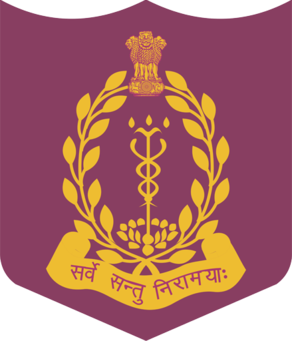Armed Forces Medical College
Armed Forces Medical College (AFMC) is a premier medical institution in India, recognized for its excellence in military medical education and research. Established on 1 May 1948 by the Indian Armed Forces, the college is located in Pune, Maharashtra. It was created by amalgamating the Army Medical Training Center, Army School of Hygiene, the Central Military Pathology Laboratory, School of Blood Transfusion and the Army School of Radiology. Over the years, AFMC has emerged as a unique institution delivering both undergraduate and postgraduate medical education, along with training in nursing and paramedical fields, exclusively for the armed forces.
History[edit | edit source]
The inception of AFMC was aimed at addressing the acute shortage of medical professionals in the post-World War II period, especially within the armed forces. The college has since evolved, expanding its educational curriculum and incorporating advanced research facilities. It has played a pivotal role in providing medical officers for the Indian Army, Navy, and Air Force, contributing significantly to the medical services in conflict zones and in times of peace.
Academic Programs[edit | edit source]
AFMC offers a range of programs including a five-year MBBS course, postgraduate courses in various medical and surgical disciplines, super-specialty courses, and nursing and paramedical training. The MBBS program at AFMC is highly competitive, with admission based on the National Eligibility cum Entrance Test (NEET) scores, followed by a rigorous selection process. The institution is affiliated with the Maharashtra University of Health Sciences (MUHS) and is recognized by the Medical Council of India (MCI).
Campus[edit | edit source]
The AFMC campus is spread over 119 acres in Pune, providing a conducive environment for learning and research. It houses modern lecture halls, laboratories, a well-equipped library, hospitals for hands-on training, and residential facilities for students and faculty. The college also boasts of advanced research centers in various medical fields.
Hospital[edit | edit source]
The Armed Forces Medical College is associated with the Command Hospital (Southern Command), Pune, which serves as a teaching hospital. This 1050-bed hospital offers a wide range of medical services to military personnel and their families, and provides practical training exposure to AFMC students.
Research and Collaboration[edit | edit source]
AFMC is actively involved in research, with a focus on areas relevant to the armed forces and public health. It collaborates with national and international institutions for research projects and exchange programs. The college regularly conducts conferences, workshops, and continuing medical education (CME) programs to keep abreast of the latest developments in medical science.
Alumni[edit | edit source]
AFMC has an extensive alumni network, with its graduates serving in leadership positions in military and civilian healthcare sectors around the world. The alumni association plays an active role in the development of the college and in mentoring current students.
Admission[edit | edit source]
Admission to AFMC is highly competitive, attracting candidates from across India. Prospective students must clear the NEET examination and undergo a selection process that includes a test of English language, reasoning, an interview, and a medical fitness examination.
Conclusion[edit | edit source]
The Armed Forces Medical College stands as a testament to the vision of providing exemplary medical education and healthcare services within the military framework. It continues to evolve, embracing new challenges and opportunities in medical science and education, while maintaining its commitment to excellence.
Search WikiMD
Ad.Tired of being Overweight? Try W8MD's physician weight loss program.
Semaglutide (Ozempic / Wegovy and Tirzepatide (Mounjaro / Zepbound) available.
Advertise on WikiMD
|
WikiMD's Wellness Encyclopedia |
| Let Food Be Thy Medicine Medicine Thy Food - Hippocrates |
Translate this page: - East Asian
中文,
日本,
한국어,
South Asian
हिन्दी,
தமிழ்,
తెలుగు,
Urdu,
ಕನ್ನಡ,
Southeast Asian
Indonesian,
Vietnamese,
Thai,
မြန်မာဘာသာ,
বাংলা
European
español,
Deutsch,
français,
Greek,
português do Brasil,
polski,
română,
русский,
Nederlands,
norsk,
svenska,
suomi,
Italian
Middle Eastern & African
عربى,
Turkish,
Persian,
Hebrew,
Afrikaans,
isiZulu,
Kiswahili,
Other
Bulgarian,
Hungarian,
Czech,
Swedish,
മലയാളം,
मराठी,
ਪੰਜਾਬੀ,
ગુજરાતી,
Portuguese,
Ukrainian
Medical Disclaimer: WikiMD is not a substitute for professional medical advice. The information on WikiMD is provided as an information resource only, may be incorrect, outdated or misleading, and is not to be used or relied on for any diagnostic or treatment purposes. Please consult your health care provider before making any healthcare decisions or for guidance about a specific medical condition. WikiMD expressly disclaims responsibility, and shall have no liability, for any damages, loss, injury, or liability whatsoever suffered as a result of your reliance on the information contained in this site. By visiting this site you agree to the foregoing terms and conditions, which may from time to time be changed or supplemented by WikiMD. If you do not agree to the foregoing terms and conditions, you should not enter or use this site. See full disclaimer.
Credits:Most images are courtesy of Wikimedia commons, and templates, categories Wikipedia, licensed under CC BY SA or similar.
Contributors: Prab R. Tumpati, MD



